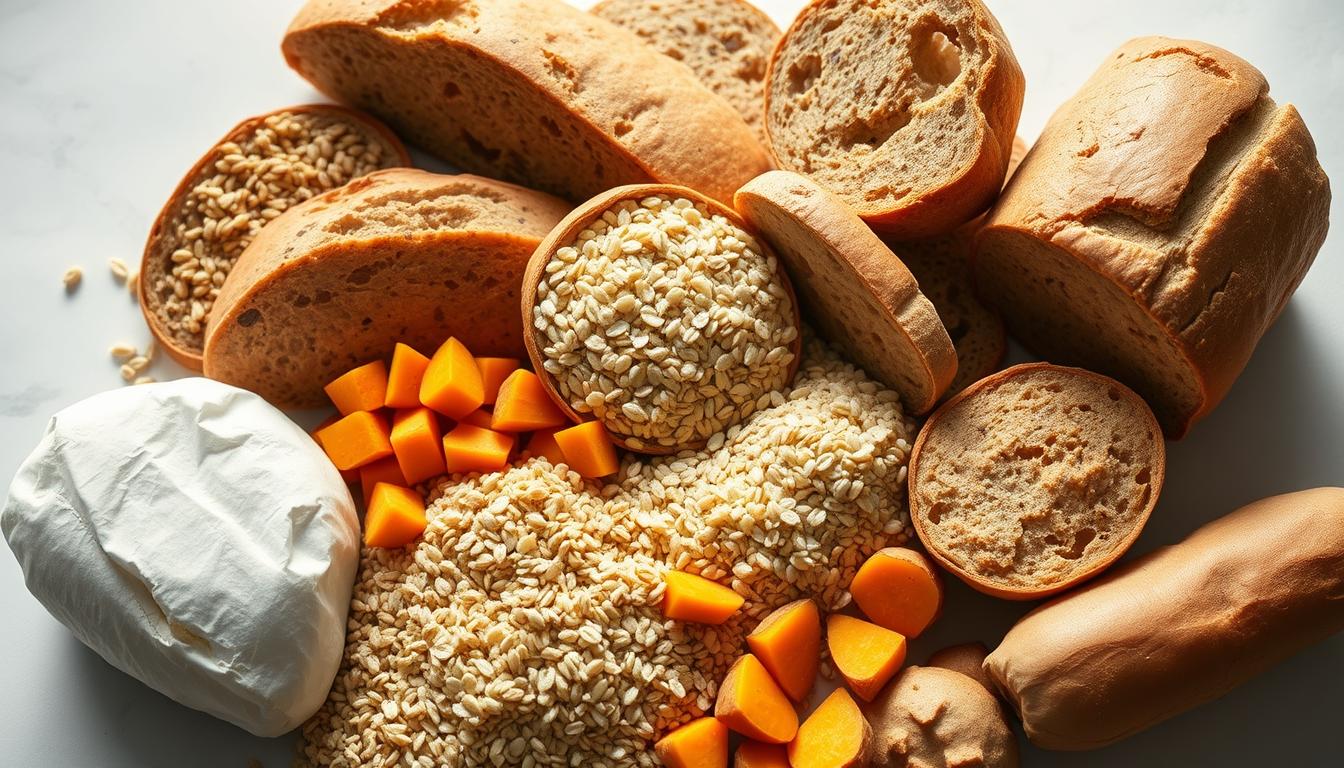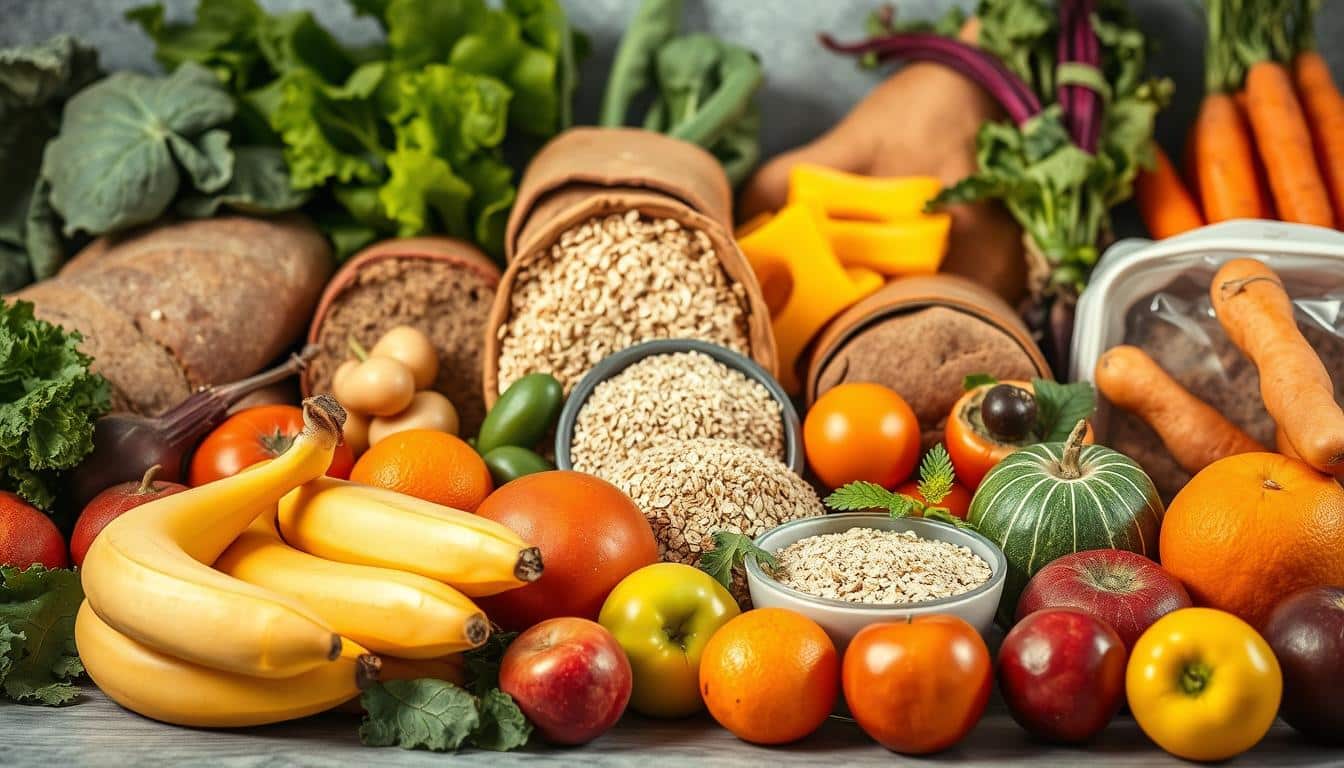Ever wonder why you feel sluggish during a tough workout? The secret lies in your energy source. Carbs are your body’s go-to fuel, especially for high-intensity exercise. They help build glycogen stores, which power your muscles and keep you going strong.
Timing matters too. For sessions longer than 60 minutes, pre-workout carb intake can make a huge difference. Even shorter workouts benefit from smart carb choices. Ready to boost your performance? Let’s dive into the science-backed facts that will help you train smarter and recover faster.
Why Carbs Are Essential Before a Workout
Have you ever felt your energy drop during a long training session? That’s because your muscles rely on carbohydrates for fuel. Just like a car needs gasoline, your body uses glucose from carbs to power through exercise.
Your body stores glucose as glycogen, which acts like an energy savings account. During intense or prolonged activity, glycogen gets used up. When it’s gone, you might “hit the wall,” a term marathoners use to describe sudden fatigue.

For sessions lasting hours exercising, maintaining glycogen levels is crucial. The International Society of Sports Nutrition (ISSN) recommends carb intake for any workout over 30 minutes. This helps prevent energy crashes and keeps your performance steady.
- Glucose fuels your muscles, ensuring you stay strong during exercise.
- Glycogen acts as your body’s backup energy source for longer sessions.
- Proper carb intake helps preserve muscle protein, aiding recovery.
Want to keep your energy levels high? Start with a high-energy breakfast foods for athletes to fuel your day and your workouts.
Types of Carbs for Pre-Workout Nutrition
Do you know the difference between quick and slow-digesting energy sources? Choosing the right type of carbohydrate can make or break your training session. Let’s break it down into simple and complex carbs, so you can fuel up like a pro.

Simple Carbs
Simple carbs are your go-to for quick energy. They digest fast, giving you an instant boost. Think bananas, dates, or honey. These are perfect if you’re eating 30-60 minutes before your session.
Why do athletes love bananas? They’re packed with natural sugars and potassium, which help prevent cramps. For more on this, check out why athletes swear by bananas for fuel and.
Complex Carbs
Complex carbs provide sustained energy. They’re rich in fiber and take longer to digest. Oats, quinoa, and sweet potatoes are great examples. Eat these 2-3 hours before your workout for steady fuel.
These foods are ideal for longer sessions or endurance events. They keep your energy levels stable and prevent blood sugar spikes.
- Quick-energy simple carbs: Bananas, white rice, honey (perfect 30-60 mins pre-workout).
- Long-lasting complex carbs: Oatmeal, quinoa, whole-grain bread (ideal 2-3 hours before).
- Balance both types to avoid mid-workout stomach issues.
- Combine simple and complex carbs for endurance events.
- Adjust your timing based on digestion speed.
By understanding these carb types, you can plan your meals to match your training needs. Whether you need a quick boost or long-lasting energy, the right choice will keep you going strong.
Best Carbs Before a Workout
Want to maximize your strength and endurance? Start with the right nutrient-packed options. The foods you choose can fuel your training and keep you energized throughout your session. Here are some top picks to include in your pre-workout meal:
- Oatmeal: A bowl of oats provides sustained energy. Mix in a scoop of protein powder for an extra boost.
- Bananas: Portable and packed with potassium, they help prevent cramps and give you a quick energy lift.
- Sweet Potatoes: High in fiber, they’re ideal for meals eaten 2-3 hours before exercise.
- White Rice: Easy to digest, making it a great choice for those with sensitive stomachs.
- Whole-Grain Toast: Pair it with nut butter or avocado for a balanced, energy-rich snack.
Pair these options with a protein source like Greek yogurt or eggs for a well-rounded meal. This combination ensures you’re fueled and ready to crush your workout.
Timing Your Pre-Workout Meal
Ever thought about how meal timing can impact your energy levels? Eating too close to your session might leave you feeling heavy, while eating too early could leave you drained. The key is finding the perfect timing for your body and workout intensity.
1-2 Hours Before Exercise
If you’re planning a moderate-intensity session, aim to eat a balanced meal 1-2 hours beforehand. This gives your body enough time to digest and convert food into energy. Think of it as fueling your engine before a long drive.
Here’s a quick guide:
- 2-3 hours before: A full meal like chicken, brown rice, and veggies ensures complete digestion.
- 1 hour before: A lighter snack like apple slices with almond butter provides moderate energy.
30-60 Minutes Before Exercise
For a quick energy boost, opt for a small snack 30-60 minutes before your workout. This is ideal for high-intensity or shorter sessions. Choose foods that are easy to digest to avoid stomach discomfort.
Try these options:
- 30 minutes before: A rice cake with honey offers quick fuel.
- Morning exercisers: A banana or a small smoothie can kickstart your day without weighing you down.
Adjust your intake based on your digestion speed and workout type. With the right timing, you’ll feel light, energized, and ready to crush your goals.
Examples of Pre-Workout Meals
Ready to fuel your body with the right meals for your training? The foods you choose can make a big difference in your energy levels and performance. Let’s break down some meal ideas tailored to your workout duration.
For Longer Workouts
Longer sessions require meals that provide sustained energy. Think of complex carbs paired with lean protein and veggies. Here’s a great example:
- Sweet Potato + Salmon + Broccoli: This combo delivers 40g carbs, 25g protein, and 10g fat. Perfect for endurance activities like running or cycling.
- Whole-Grain Wrap with Turkey + Avocado: Packed with 45g carbs, 20g protein, and 15g fat, it’s ideal for a 90-minute hike.
For Shorter Workouts
Shorter, high-intensity sessions need quick-digesting options. Focus on simple carbs and a bit of protein for a fast energy boost. Try these:
- Greek Yogurt + Berries: Provides 20g carbs, 15g protein, and 5g fat. Great for a 30-minute HIIT session.
- Rice Cake + Peanut Butter + Jam: Offers 25g carbs, 5g protein, and 8g fat. Perfect for a 45-minute weightlifting session.
| Meal | Carbs (g) | Protein (g) | Fat (g) |
|---|---|---|---|
| Sweet Potato + Salmon + Broccoli | 40 | 25 | 10 |
| Whole-Grain Wrap with Turkey + Avocado | 45 | 20 | 15 |
| Greek Yogurt + Berries | 20 | 15 | 5 |
| Rice Cake + Peanut Butter + Jam | 25 | 5 | 8 |
These meals are designed to keep you energized and prevent mid-workout hunger. Adjust portions based on your needs and enjoy the benefits of a well-fueled session!
Supplements to Enhance Performance
Looking to take your training to the next level? Supplements can be a game-changer when used correctly. They help boost energy, build muscle mass, and improve recovery. But not all supplements are created equal. Let’s break down the proven options and the ones you might want to skip.
First, always consult a doctor before starting any new supplement. This ensures it’s safe for your body and aligns with your goals. Here are some top picks backed by sports nutrition research:
- Caffeine: Take 3-6 mg per kg of body weight 45 minutes before exercise. It boosts endurance and focus.
- Creatine: A daily dose of 5g helps increase strength and power output.
- BCAAs: These amino acids reduce fatigue and support muscle recovery.
- Beta-Alanine: Reduces muscle burn during high-intensity sprints.
Pairing these supplements with carb-rich meals can maximize their benefits. For example, caffeine works well with a banana or toast for quick energy. Creatine pairs nicely with oatmeal or sweet potatoes for sustained fuel.
Some athletes avoid pre-workout stimulants due to sensitivity or personal preference. If you’re new to supplements, start with one at a time to see how your body reacts. Safety first!
Conclusion
Ready to fuel your training with smart choices? Combining carbs with protein ensures sustained energy and supports muscle recovery. Start with 0.5g of carbs per pound of body weight 1-3 hours before your session.
Track how different carb types affect your performance. Pair your new nutrition plan with proper hydration to stay at your peak. Bookmark this guide for your next grocery trip and make every exercise session count!


